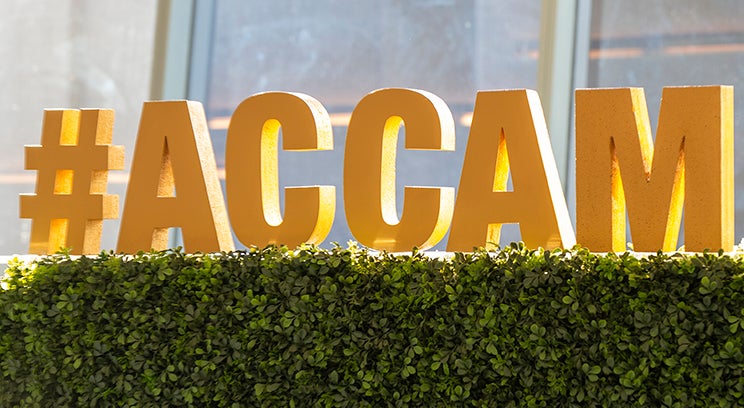
This is the second in a two-part series recapping the 2020 ACC Virtual Meeting. In this article, Jonathan Huie — a recent American University Washington College of Law graduate and ACC Fellow — highlights the most impactful moments from the keynote speeches. Read the first part of the series on the lessons learned from #ACCAM20.
This year’s Annual Meeting was unlike any other. In response to unprecedented circumstances, the Association of Corporate Counsel (ACC) held its first virtual Annual Meeting October 12-16, 2020. With over 2000 in-house counsel in attendance, I think it is safe to say the meeting was a hit!
I had the opportunity to attend the meeting as an ACC Legal Fellow. I approached the event from the perspective of a recent law school graduate and incoming litigation associate with relatively little insight on the complexities of corporate governance. It was an eye-opening experience for me.
This year’s six keynote speakers covered topics that were both timely and personal: leadership, crisis management, and mental health. In this article, I provide a recap of this year’s keynotes and give my thoughts on the messages imparted by the panelists.
Keynotes and themes
There was a keynote, sometimes two, held on each day of the Annual Meeting. The following is a brief recap (and no replacement for the actual event — I highly recommend those interested to watch these recorded presentations):
Monday: Agility, Courage, Fortitude: The New Leadership Standard
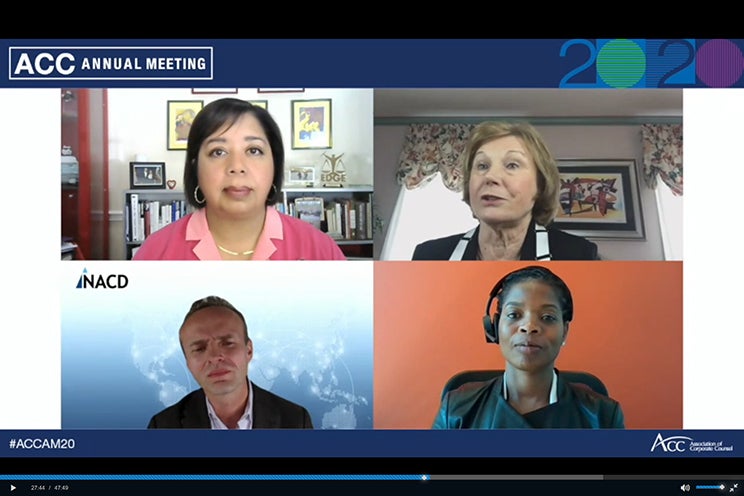
Michelle Nettles, chief people and culture officer at ManpowerGroup; Friso van der Oord, senior VP, Content at NACD; and the Hon. Cari Dominguez, chair of the US Equal Employment Opportunity Commission (retired) and corporate director at ManpowerGroup, offered insights on what it takes to be a leader in today’s challenging and uncertain environment. They discussed the increasing demands on boards, namely that directors are no longer required to just create shareholder value, but also stakeholder value.
Issues of diversity and inclusion, as well as environmental, social, and governance factors, are increasingly coming to the forefront of directors’ minds addressing these issues makes for good business. And just as the demands on directors have increased, the same holds true for chief legal officers/general counsel (CLO/GC).
Legal leaders in organizations can no longer just be an expert on the law but a strategic asset to the board. CLOs/GCs must now exercise sound judgment, take into consideration all legal, business, and branding nuances when dealing with issues, and ensure their boards are apprised of the next big issues.
Finally, communication is especially key now — boards and CLOs/GCs must deliver compelling messages quickly and efficiently.
Tuesday: The Fox and the Hedgehog: Leadership in Times of Crisis
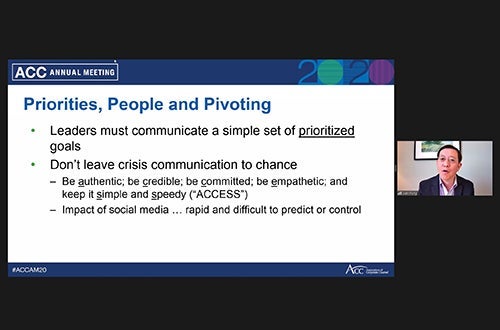
Ivan Fong, 3M general counsel, presented on leading in times of crisis and provided attendees with a short, useful general roadmap to handling crises. He highlighted the need for leadership (where in-house counsel should take charge of these efforts) in times of crisis and the importance to plan for black swan events.
He stressed the need to test any plans ahead of time to discover any areas that warrant adjustment and to better refine those plans. When putting together a plan, leadership must think about its three Ps: Priorities, People, and Pivoting.
Priorities must be clearly and succinctly defined. People should be taken care of before, during, and after any adversity, as properly managing human capital over time will yield dividends. Lastly, companies and leadership should not be afraid to pivot from crisis responding proactively and thoughtfully to crisis can yield net positives.
Ivan acknowledged that while the plan and execution for each organization will be unique, following this general roadmap may help lessen the pain during uncertain times.
Wednesday: Finding Peace in a Burned-out World
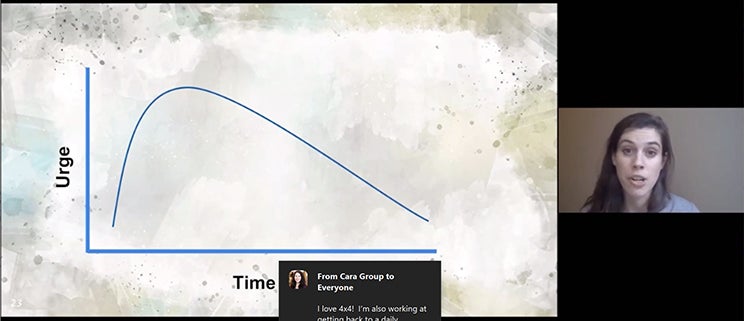
Dr. Lily Brown, assistant professor of Psychology in Psychiatry and director at the Center for the Treatment and Study of Anxiety at the Perelman School of Medicine at the University of Pennsylvania, discussed issues affecting many in the legal profession: burnout and anxiety. She explained that every emotion is composed of three interconnected components:
- Cognition: the things we tell ourselves about our emotional experience;
- Behavior: the urges we have and choices we make; and
- Physiology: what we experience in our bodies.
Each factor has a bearing on the others. To combat anxiety, worry cycles, procrastination, and burnout, Dr. Brown recommended trying two measures:
- Taking time and creating space between negative urges and the definitive act or behavior in response to those impulses. Doing so will eventually allow the negative urge to subside, and repeatedly doing so make us more resilient to them.
- During times of stress, trying a box or 4X4 breathing exercise.
Both measures help emotion regulation, which refers to our capacity to regulate our emotional experiences in specific circumstances. Emotion regulation is also a strong predictor for lower anxiety.
Thursday: Sustainability in Turbulent Times
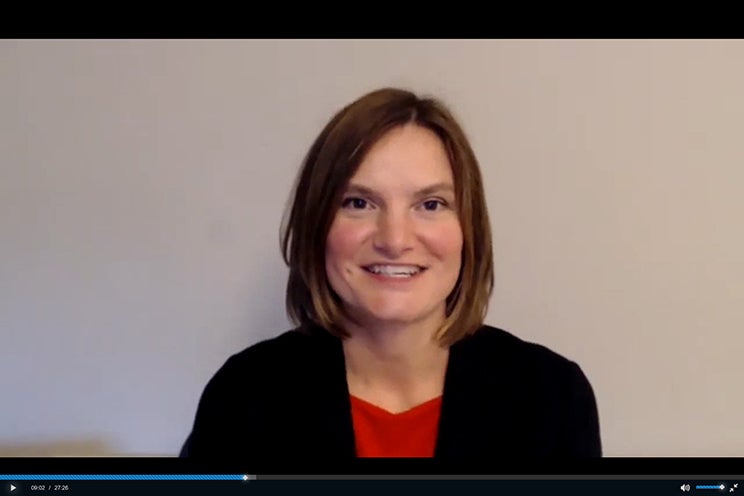
Jessica Fries, executive chairman of His Royal Highness The Prince of Wales’s Accounting for Sustainability Project (A4S), shared some insights on sustainability as it relates to corporate leadership. Sustainability impacts the bottom line for companies and may be broken down into three subtopics:
- Environmental (e.g., rapid loss of species),
- Social (e.g., consequences of the pandemic), and
- Economic (i.e., the core of what a sustainable business is).
To be a sustainable organization, Jessica notes that it is necessary to have a holistic approach in managing all three sustainability factors.
Taking this approach yield dividends, even during the pandemic. Big investment research houses have found that, for example, companies that pay attention to ESG (environmental, social, and governance) credentials typically perform better than others in the same sector. Thus, building a strong, sustainable business can be a net positive for society and on the bottom line.
Certain trends also are instructive in how well an organization does in the face of uncertainty. Supply chain transparency, conducting scenario analyses, and disciplined approaches on company purpose and its impact on society as whole will all likely enable companies to deliver big dividends in the future.
Lastly, communication is key. Transparently communicating plans and strategies for not only the company’s short-term, but also how the organization is building toward a resilient future is critical. Investors and other stakeholders are interested in this and their interest will not go away in the future.
Thursday: Navigating Through a Crisis – How to Overcome Challenging Situations
Judy Smith, crisis management expert and inspiration for Scandal; Shawn Wright, partner at Blank Rome LLP; and Mahrukh Hussain, general counsel and vice president of McDonald's Corporation, spoke to the specifics of navigating a crisis.
First, the panel explained that crises are generally broken into three categories: public safety, financial loss, and brand damage.
Second, crisis management begins with a critical assessment of those black swan events that pose the biggest threats to a company. From, there crisis management team (or teams, depending on the complexity and size of operations) should be formed to help develop an actual management plan. Those plans should be tested regularly to help prepare the organization.
Third, companies should actively try to build goodwill and relationships with stakeholders in good times. This may mean investing in ESG factors during the good times. In so doing, companies are able to leverage the “banked” goodwill to weather the hard times.
Fourth, when disaster hits, communication should be tightly managed by legal departments and preferably with trusted crisis professionals. Messaging to the public and stakeholders must be quick, accurate, and consistent. Failure to do so means externalities will define the narrative.
Finally, the panelists foresee the next crisis stemming from natural disasters (pandemic, environmental), personal injury, social justice issues, workplace culture, and data protection.
Friday: Leading with Compassion
Rudhir Krishtel, executive coach at Krishtel LLC, led attendees on a journey to realize that compassionate leadership is not only attainable but also a worthy endeavor for organizations and its leaders. Compassion can prevent burnout and have real effects on physical health. To do that we must first take control of what is going on in our minds and focus less on things outside of our control.
Rudhir explained that the elements of compassion are three-fold:
- Noticing suffering for ourselves or for others;
- Having empathy (e.g., feeling someone else’s pain); and
- Acting to ease that suffering.
He notes that often we have issues with noticing the suffering and feeling that pain. In fact, we tend to lack empathy over time, an inability to see others’ perspectives. Lawyers are quick to be empathetic to clients, but that leaves us less likely to offer empathy to ourselves or our teammates.
In order to cultivate compassion for ourselves, it is important to practice mindfulness meditation, or simply just paying attention. We must also practice compassion for ourselves, being mindful of our internal thoughts and the impact they have on our physical selves and treating yourself like you would a friend or child in times of need.
In this instance, you do not fix an issue right away, you are kind and present for the other for a moment. For example, if your kid gets hurt, you hold him for a bit.
Finally, we must show compassion for others, be mindful when interacting with others, engaging in meditative breathing and taking stock of one’s own thoughts and emotions before responding to others.




